(共26套)全国通用最新中考英语语法讲义及配套练习汇总(含所有中考语法知识)
- 格式:docx
- 大小:1.11 MB
- 文档页数:427
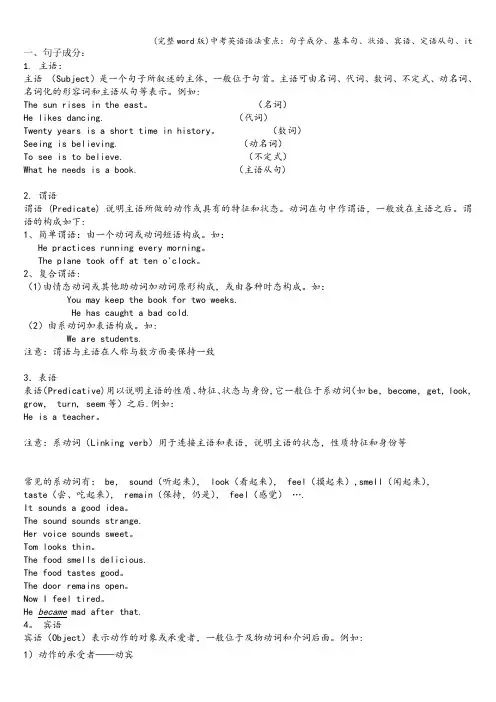
一、句子成分:1.主语:主语(Subject)是一个句子所叙述的主体,一般位于句首。
主语可由名词、代词、数词、不定式、动名词、名词化的形容词和主语从句等表示。
例如:The sun rises in the east。
(名词)He likes dancing. (代词)Twenty years is a short time in history。
(数词)Seeing is believing. (动名词)To see is to believe. (不定式)What he needs is a book. (主语从句)2. 谓语谓语 (Predicate) 说明主语所做的动作或具有的特征和状态。
动词在句中作谓语,一般放在主语之后。
谓语的构成如下:1、简单谓语:由一个动词或动词短语构成。
如:He practices running every morning。
The plane took off at ten o'clock。
2、复合谓语:(1)由情态动词或其他助动词加动词原形构成,或由各种时态构成。
如:You may keep the book for two weeks.He has caught a bad cold.(2)由系动词加表语构成。
如:We are students.注意:谓语与主语在人称与数方面要保持一致3.表语表语(Predicative)用以说明主语的性质、特征、状态与身份,它一般位于系动词(如be, become, get, look, grow, turn, seem等)之后.例如:He is a teacher。
注意:系动词(Linking verb)用于连接主语和表语,说明主语的状态,性质特征和身份等常见的系动词有: be, sound(听起来), look(看起来), feel(摸起来),smell(闻起来),taste(尝、吃起来), remain(保持,仍是), feel(感觉)….It sounds a good idea。
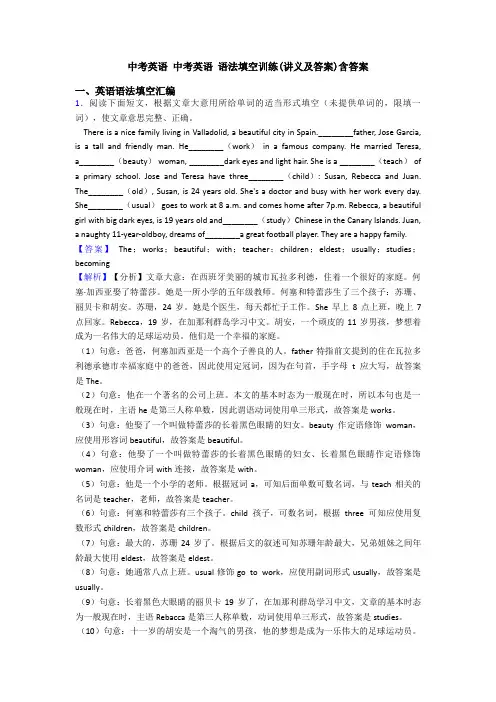
中考英语中考英语语法填空训练(讲义及答案)含答案一、英语语法填空汇编1.阅读下面短文,根据文章大意用所给单词的适当形式填空(未提供单词的,限填一词),使文章意思完整、正确。
There is a nice family living in Valladolid, a beautiful city in Spain.________father, Jose Garcia, is a tall and friendly man. He________(work)in a famous company. He married Teresa, a________(beauty) woman, ________dark eyes and light hair. She is a ________(teach) of a primary school. Jose and Teresa have three________(child): Susan, Rebecca and Juan. The________(old), Susan, is 24 years old. She's a doctor and busy with her work every day. She________(usual) goes to work at 8 a.m. and comes home after 7p.m. Rebecca, a beautiful girl with big dark eyes, is 19 years old and________(study)Chinese in the Canary Islands. Juan, a naughty 11-year-oldboy, dreams of________a great football player. They are a happy family.【答案】The;works;beautiful;with;teacher;children;eldest;usually;studies;becoming【解析】【分析】文章大意:在西班牙美丽的城市瓦拉多利德,住着一个很好的家庭。
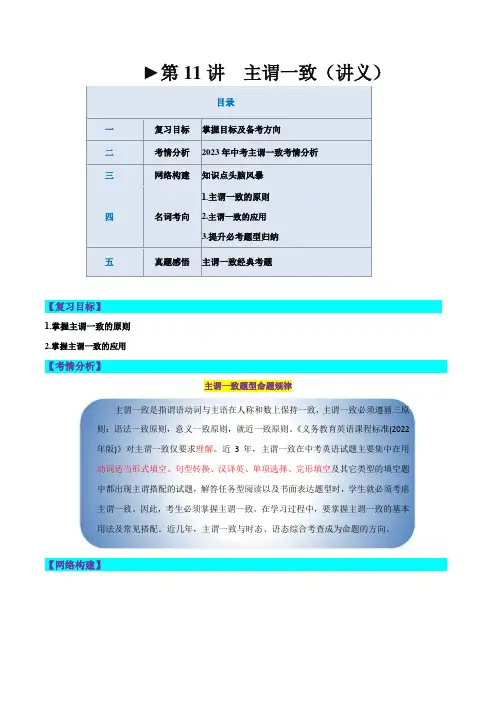
►第11讲主谓一致(讲义)目录一复习目标掌握目标及备考方向二考情分析2023年中考主谓一致考情分析三网络构建知识点头脑风暴四名词考向1.主谓一致的原则2.主谓一致的应用3.提升必考题型归纳五真题感悟主谓一致经典考题【复习目标】1.掌握主谓一致的原则2.掌握主谓一致的应用【考情分析】主谓一致题型命题规律【网络构建】主谓一致是指谓语动词与主语在人称和数上保持一致,主谓一致必须遵循三原则:语法一致原则,意义一致原则,就近一致原则。
《义务教育英语课程标准(2022年版)》对主谓一致仅要求理解。
近3年,主谓一致在中考英语试题主要集中在用动词适当形式填空、句型转换、汉译英、单项选择、完形填空及其它类型的填空题中都出现主谓搭配的试题,解答任务型阅读以及书面表达题型时,学生就必须考虑主谓一致。
因此,考生必须掌握主谓一致。
在学习过程中,要掌握主谓一致的基本用法及常见搭配。
近几年,主谓一致与时态、语态综合考查成为命题的方向。
考向一主谓一致的原则1.语法一致原则主要指语法形式上一致,即谓语动词必须在人称和数的形式上与主语保持一致,这一原则多适用于句子主语是名词或代词的情况。
➢He is a famous singer.➢The boys who are playing the guitar are my cousins.➢Life is full of the unexpected.➢ A sad movie makes me cry.➢Their mother cooks breakfast for them every morning.2.意义一致原则以主语表示的意义来决定谓语动词的单、复数。
这一原则多适用于句中主语为集体名词、“the+形容词/v-ed/v-ing”、以-s结尾的名词、what-从句;由and或both...and连接的并列主语;主语为时间、度量、价值、数目等意义的词语、某些不定代词、what、which、who等。
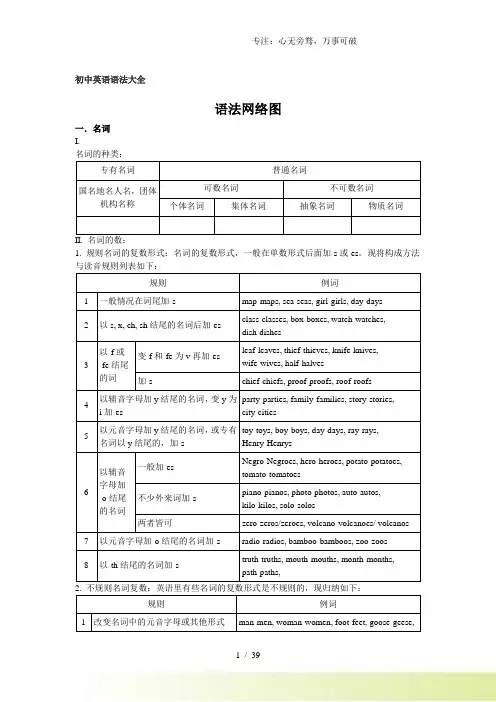
初中英语语法大全语法网络图一.名词I.专有名词普通名词国名地名人名,团体机构名称可数名词不可数名词个体名词集体名词抽象名词物质名词II. 名词的数:1. 规则名词的复数形式:名词的复数形式,一般在单数形式后面加-s或-es。
现将构成方法规则例词1一般情况在词尾加-s map-maps, sea-seas, girl-girls, day-days2以s, x, ch, sh结尾的名词后加-es class-classes, box-boxes, watch-watches, dish-dishes3以-f或-fe结尾的词变-f和-fe为v再加-esleaf-leaves, thief-thieves, knife-knives,wife-wives, half-halves加-s chief-chiefs, proof-proofs, roof-roofs4以辅音字母加y结尾的名词,变y为i加-esparty-parties, family-families, story-stories,city-cities5以元音字母加y结尾的名词,或专有名词以y结尾的,加-stoy-toys, boy-boys, day-days, ray-rays,Henry-Henrys6以辅音字母加-o结尾的名词一般加-esNegro-Negroes, hero-heroes, potato-potatoes,tomato-tomatoes不少外来词加-spiano-pianos, photo-photos, auto-autos,kilo-kilos, solo-solos两者皆可zero-zeros/zeroes, volcano-volcanoes/ volcanos7以元音字母加-o结尾的名词加-s radio-radios, bamboo-bamboos, zoo-zoos8以-th结尾的名词加-s truth-truths, mouth-mouths, month-months, path-paths,规则例词1改变名词中的元音字母或其他形式man-men, woman-women, foot-feet, goose-geese,mouse-mice2单复数相同sheep, deer, means, works, fish, yuan, jin, 3只有复数形式trousers, clothes, thanks, goods, glasses, 4一些集体名词总是用作复数people, police5部分集体名词既可以作单数(整体)也可以作复数(成员)class, family, crowd, couple, group, government,population, team, public, party6复数形式表示特别含义customs(海关), times(时代), spirits(情绪), drinks(饮料), sands(沙滩), papers(文件报纸), looks(外表), brains(头脑智力), greens(青菜)7表示“某国人”加-sAmericans, Australians, Germans, Greeks,Swedes, Europeans单复数同形Swiss, Portuguese, Chinese, Japanese以-man或-woman结尾的改为-men,-womenEnglishmen, Frenchwomen8合成名词将主体名词变为复数sons-in-law, lookers-on, passers-by, story-tellers,boy friends无主体名词时将最后一部分变为复数grown-ups, housewives, stopwatches 将两部分变为复数women singers, men servantsIII. 名词的所有格:名词在句中表示所有关系的语法形式叫做名词所有格。
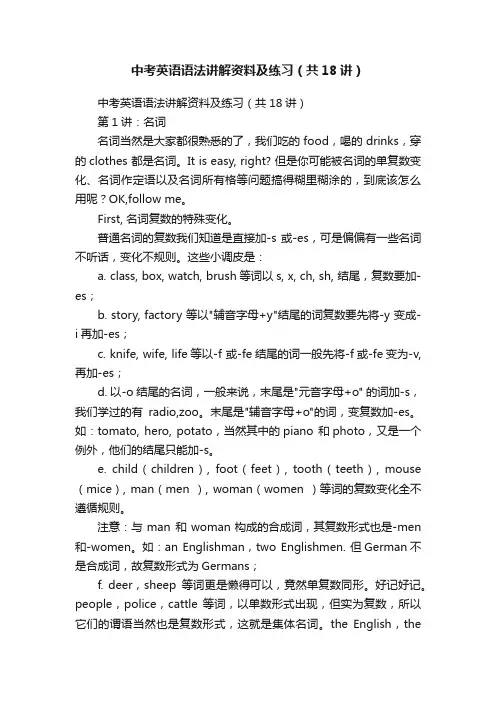
中考英语语法讲解资料及练习(共18讲)中考英语语法讲解资料及练习(共18讲)第1讲:名词名词当然是大家都很熟悉的了,我们吃的food,喝的drinks,穿的clothes 都是名词。
It is easy, right? 但是你可能被名词的单复数变化、名词作定语以及名词所有格等问题搞得糊里糊涂的,到底该怎么用呢?OK,follow me。
First, 名词复数的特殊变化。
普通名词的复数我们知道是直接加-s或-es,可是偏偏有一些名词不听话,变化不规则。
这些小调皮是:a. class, box, watch, brush等词以s, x, ch, sh, 结尾,复数要加-es;b. story, factory 等以"辅音字母+y"结尾的词复数要先将-y 变成-i再加-es;c. knife, wife, life等以-f 或-fe结尾的词一般先将-f或-fe变为-v, 再加-es;d. 以-o结尾的名词,一般来说,末尾是"元音字母+o" 的词加-s,我们学过的有radio,zoo。
末尾是"辅音字母+o"的词,变复数加-es。
如:tomato, hero, potato,当然其中的piano 和photo,又是一个例外,他们的结尾只能加-s。
e. child(children), foot(feet), tooth(teeth), mouse (mice), man(men ), woman(women )等词的复数变化全不遵循规则。
注意:与man 和woman构成的合成词,其复数形式也是-men 和-women。
如:an Englishman,two Englishmen. 但German不是合成词,故复数形式为Germans;f. deer,sheep等词更是懒得可以,竟然单复数同形。
好记好记。
people,police,cattle 等词,以单数形式出现,但实为复数,所以它们的谓语当然也是复数形式,这就是集体名词。
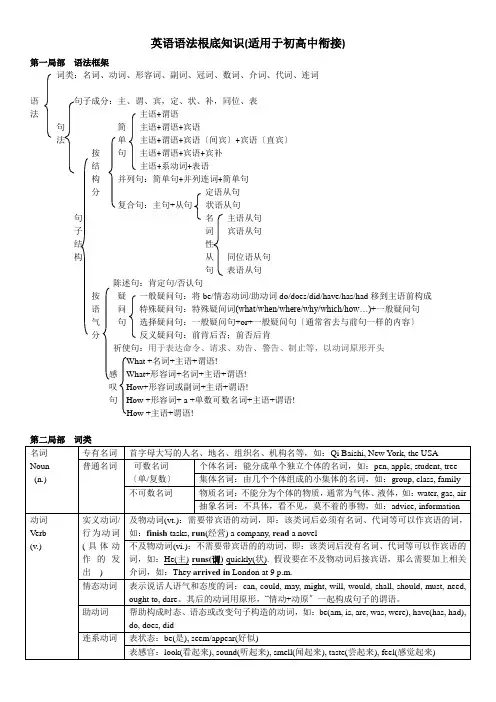
英语语法根底知识(适用于初高中衔接)第一局部语法框架词类:名词、动词、形容词、副词、冠词、数词、介词、代词、连词语句子成分:主、谓、宾,定、状、补,同位、表法主语+谓语句简主语+谓语+宾语法单主语+谓语+宾语〔间宾〕+宾语〔直宾〕按句主语+谓语+宾语+宾补结主语+系动词+表语构并列句:简单句+并列连词+简单句分定语从句复合句:主句+从句状语从句句名主语从句子词宾语从句结性构从同位语从句句表语从句陈述句:肯定句/否认句按疑一般疑问句:将be/情态动词/助动词do/does/did/have/has/had移到主语前构成语问特殊疑问句:特殊疑问词(what/when/where/why/which/how…)+一般疑问句气句选择疑问句:一般疑问句+or+一般疑问句〔通常省去与前句一样的内容〕分反义疑问句:前肯后否;前否后肯祈使句:用于表达命令、请求、劝告、警告、制止等,以动词原形开头What +名词+主语+谓语!感What+形容词+名词+主语+谓语!叹How+形容词或副词+主语+谓语!句How +形容词+ a +单数可数名词+主语+谓语!How +主语+谓语!第三局部句子成分及简单句一、简单句的五大根本句型:主语+ 谓语名词/代词/动名词/不定式+ 不及物动词主语+ 谓语+ 宾语名词/代词/动名词/不定式+ 及物动词+ 名词/代词/动名词/不定式主语+ 谓语+ 宾语〔间宾〕+ 宾语〔直宾〕名词/代词/动名词/不定式+ 及物动词+ 代词+ 名词主语+ 谓语+ 宾语+ 宾补名词/代词/动名词/不定式+ 及物动词+ 代词+ 代词/名词/数词/非谓语动词/副词/形容词/介词短语主语+ 系动词+ 表语名词/代词/动名词/不定式+ 系动词+ 代词+ 代词/名词/数词/非谓语动词/副词/形容词/介词短语实例依次如下:She arrived (on time). 主谓(状)她按时到了。
We will accept (their) invitation. 主谓(定)宾我们将承受他们的邀请。
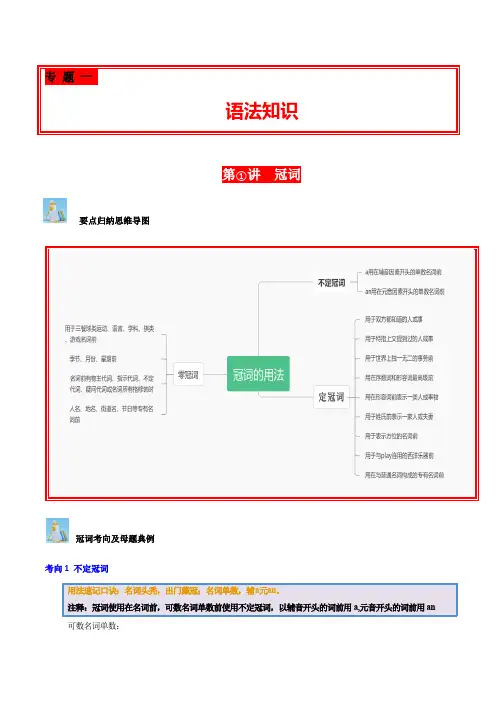
专题一语法知识语法知语法知识识第①讲冠词要点归纳思维导图冠词考向及母题典例考向1 不定冠词用法速记口诀:名词头秃,出门戴冠;名词单数,辅a元a n。
注释:冠词使用在名词前,可数名词单数前使用不定冠词,以辅音开头的词前用a,元音开头的词前用an 可数名词单数:以辅音音素开头的单词或字母前用a: a door ;a cat ;a"k".以元音音素开头的单词或字母前用an: an egg;an apple ;an"o"...(2021·内蒙古呼和浩特·统考中考真题)We often have three meals_______day. And we usually(2021·湖北恩施·统考中考真题)My aunt has only one child, and she wants ______ child.A.the second B.a second C.two【答案】B【详解】句意:我姑姑只有一个孩子,她想要第二个孩子。
考查序数词用法。
根据“My aunt has only one child, and she wants…child.”可知,此处表示“再一,又一”,用“不定冠词+序数词”表示,故选B。
考向2 定冠词(2024·吉林·统考中考真题)Jenny ordered a hamburger and ________ hamburger was nice.A.a B.an C.the(2024·湖南岳阳·统考中考真题)Hangzhou will hold ________ 19th Asian Games in 2023.A.a B.an C.the(2024·黑龙江绥化·统考中考真题)Bob is my brother. He likes playing ________ basketball, but he doesn’t like playing ________ piano.A.the; a B./; the C.an; the【答案】B【详解】句意:鲍勃是我的兄弟。
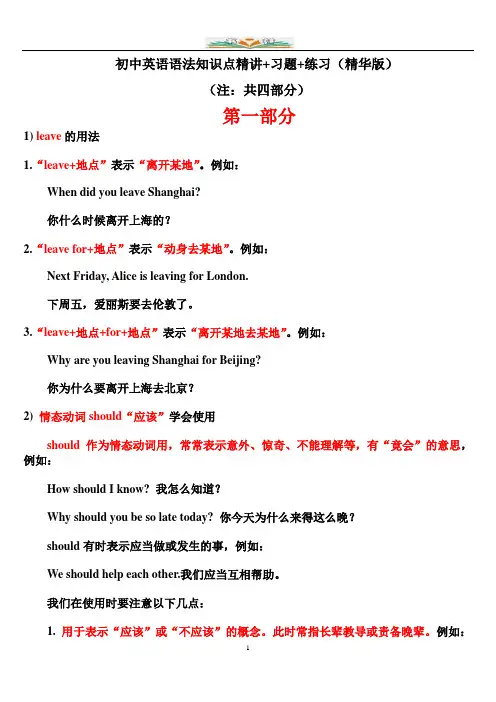
初中英语语法知识点精讲+习题+练习(精华版)(注:共四部分)第一部分1) leave的用法1.“leave+地点”表示“离开某地”。
例如:When did you leave Shanghai?你什么时候离开上海的?2.“leave for+地点”表示“动身去某地”。
例如:Next Friday, Alice is leaving for London.下周五,爱丽斯要去伦敦了。
3.“leave+地点+for+地点”表示“离开某地去某地”。
例如:Why are you leaving Shanghai for Beijing?你为什么要离开上海去北京?2) 情态动词should“应该”学会使用should作为情态动词用,常常表示意外、惊奇、不能理解等,有“竟会”的意思,例如:How should I know? 我怎么知道?Why should you be so late today? 你今天为什么来得这么晚?should有时表示应当做或发生的事,例如:We should help each other.我们应当互相帮助。
我们在使用时要注意以下几点:1. 用于表示“应该”或“不应该”的概念。
此时常指长辈教导或责备晚辈。
例如:You should be here with clean hands. 你应该把手洗干净了再来。
2. 用于提出意见劝导别人。
例如:You should go to the doctor if you feel ill. 如果你感觉不舒服,你最好去看医生。
3.用于表示可能性。
should的这一用法是考试中常常出现的考点之一。
例如:We should arrive by supper time. 我们在晚饭前就能到了。
She should be here any moment. 她随时都可能来。
3) What...? 与Which...?1. what 与which 都是疑问代词,都可以指人或事物,但是what仅用来询问职业。
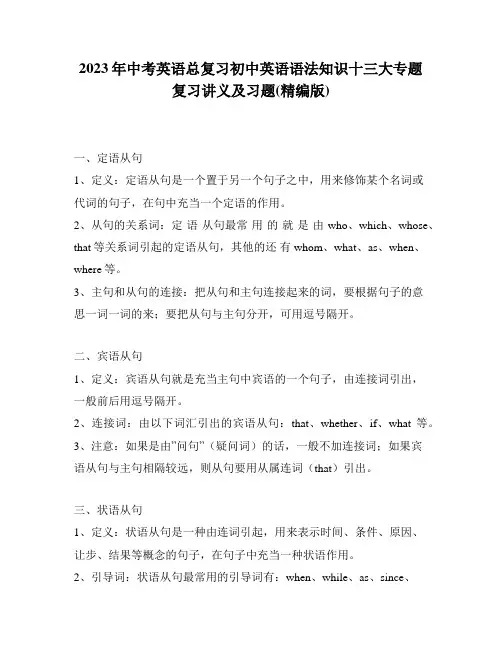
2023年中考英语总复习初中英语语法知识十三大专题复习讲义及习题(精编版)一、定语从句1、定义:定语从句是一个置于另一个句子之中,用来修饰某个名词或代词的句子,在句中充当一个定语的作用。
2、从句的关系词:定语从句最常用的就是由 who、which、whose、that等关系词引起的定语从句,其他的还有 whom、what、as、when、where等。
3、主句和从句的连接:把从句和主句连接起来的词,要根据句子的意思一词一词的来;要把从句与主句分开,可用逗号隔开。
二、宾语从句1、定义:宾语从句就是充当主句中宾语的一个句子,由连接词引出,一般前后用逗号隔开。
2、连接词:由以下词汇引出的宾语从句:that、whether、if、what等。
3、注意:如果是由”问句”(疑问词)的话,一般不加连接词;如果宾语从句与主句相隔较远,则从句要用从属连词(that)引出。
三、状语从句1、定义:状语从句是一种由连词引起,用来表示时间、条件、原因、让步、结果等概念的句子,在句子中充当一种状语作用。
2、引导词:状语从句最常用的引导词有:when、while、as、since、until、before、after、if、whether、because等。
3、务必注意:时间、地点、条件状语从句切忌混淆,要分清才可正确运用。
四、名词性从句1、定义:名词性从句又称为词性的从句,是一个句子充当主句中的一个名词,它可单独作句子的主语,宾语或表语。
2、从句的连接词:要表达名词性从句的概念,最常采用的就是由关系代词(who, whom, which, that等)、关系副词(when, where, why, how 等)以及由从属连词(if, whether等)引起的名词性从句。
3、注意事项:将其从名词性从句区分开来可用逗号隔开;也要注意主句和从句之间的位置关系,情况不同,连接词可以不同。
五、简单句1、定义:简单句也叫单个句子,是由一个主语和一个谓语动词构成的一句话;当主语是第一人称或三单时,句尾不加to。
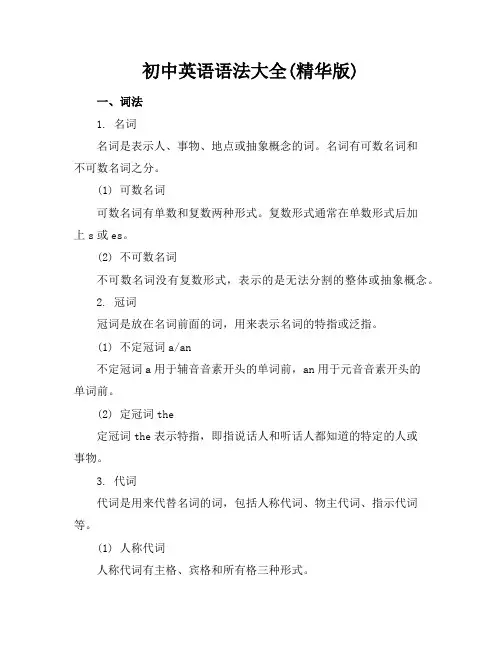
初中英语语法大全(精华版)一、词法1. 名词名词是表示人、事物、地点或抽象概念的词。
名词有可数名词和不可数名词之分。
(1) 可数名词可数名词有单数和复数两种形式。
复数形式通常在单数形式后加上s或es。
(2) 不可数名词不可数名词没有复数形式,表示的是无法分割的整体或抽象概念。
2. 冠词冠词是放在名词前面的词,用来表示名词的特指或泛指。
(1) 不定冠词a/an不定冠词a用于辅音音素开头的单词前,an用于元音音素开头的单词前。
(2) 定冠词the定冠词the表示特指,即指说话人和听话人都知道的特定的人或事物。
3. 代词代词是用来代替名词的词,包括人称代词、物主代词、指示代词等。
(1) 人称代词人称代词有主格、宾格和所有格三种形式。
(2) 物主代词物主代词表示所有关系,分为形容词性物主代词和名词性物主代词。
(3) 指示代词指示代词用来指代前面提到的人或事物,有this/that/these/those等。
4. 形容词形容词是用来修饰名词的词,表示人或事物的性质、状态等。
5. 副词副词是用来修饰动词、形容词、其他副词或全句的词,表示时间、地点、程度等。
二、句法1. 句子成分句子成分包括主语、谓语、宾语、定语、状语等。
(1) 主语主语是句子叙述的对象,表示句子讲述的是“谁”或“什么”。
(2) 谓语谓语是句子中表示动作、状态或存在的部分,说明主语“做什么”、“是什么”或“怎么样”。
(3) 宾语宾语是句子中表示动作的对象,表示动作的承受者。
(4) 定语定语是句子中修饰名词的成分,表示名词的性质、特征等。
(5) 状语状语是句子中表示时间、地点、原因、条件、程度等的成分。
2. 基本句型英语句子有五种基本句型,分别是:(1) 主语+谓语(2) 主语+谓语+宾语(3) 主语+谓语+宾语+宾语(4) 主语+谓语+宾语+宾语补足语(5) 主语+系动词+表语3. 简单句、并列句和复合句(1) 简单句简单句是由一个主语和一个谓语构成的句子。
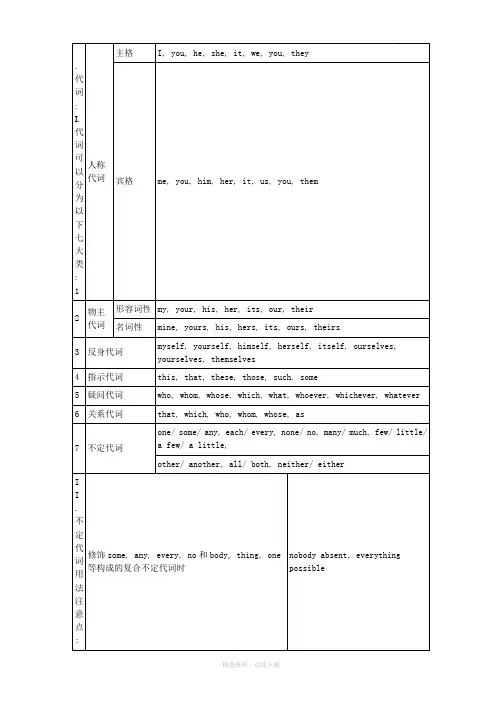
初中英语中考代词专项练习班级考号姓名总分一、真题练习一、单项选择。
1.-Jane, is this your umbrella?-No, it's not .I didn't take one this morning. (福建福州)A.meB.myC.mine2.-I'm afraid I won't pass the exam.-Come on,Bill.You should believe in .That's the secret of success. (江苏连云港)A.myselfB.ourselvesC.yourselfD.yourselves3.The man over there is old frienD.He is a policeman. (重庆)A.IB.meC.myD.mine4.We can't do it that way-but whether it will work is matter. (安徽)A.otherB.anotherC.eachD.every5.-What would you like, tea or coffee?- ,thanks.I just prefer a glass of water. (福建福州)A.BothB.NeitherC.Either6.There are enough cups for each visitor to have (四川宜宾)A.oneB.itC.thisD.that7.-I still want to drink something.May I have cup of juice?-Certainly.Here you are. (山东滨州)A.otherB.moreC.anotherD.else8.-What's name?- is EriC. (四川南充)A.his;HeB.his; HisC.he; HisD.he; He9.-What would you like to drink?-I'm very thirsty. you can get.Just get it now. (江苏南京)A.AnythingB.B.SomethingC.C.NothingD.D.Other things10.Unfortunately I was sitting at the table with smokers on side of me.(浙江杭州)A.eitherB.bothC.otherD.all11.My mother used to make breakfast for every morning,but now I do it myself.(重庆)A.mineB.myC.ID.me12.- is your father? Does he still work as an engineer?-Yes,he has been an engineer for thirty years. (安徽)A.WhoB.HowC.WhatD.Which13.Hurry up, kids!The school bus is coming.We have time left.(广东广州)A.fewB.a fewC.littleD.a little14.Everyone makes mistakes in his or her life.The important thing is not to repeat .(江苏南京)A.itB.themC.himD.her15.-Bill,is that you sister's pet dog?-No. is white. (四川自贡)A.SheB.HerC.Hers二、根据句意及汉语或英语提示,用单词的正确形式填空。
2020 年中考英语总复习基础语法专题复习讲义目录:1.专题七动词的种类2.专题八动词的时态3.专题九被动语态专题七动词的种类学前自测(发现考点)( )1. Lucy and her friend will at the airport in half an hour. They are going to Taiwan.A. playB. comeC. leaveD. meet( )2. —May I play computer games now, Mum?—No, you __ . You haven't finished your homework yet.A. don'tB. needn'tC. can'tD. may not( )3. —Shall we take a bus to the library?—It ’ s not far. I think we __t_ake a bus. Let ’ s walk there.A. mustn'tB. couldn'tC. can'tD. needn't( )4. —How much did this dictionary ___ you, Sally? —I got it for 90 yuan.A. useB. costC. takeD. spend( )5. It is very hot here. Why not your coat?A. to take offB. put offC. take offD. puton( )6. The hotel is not far, so you take a bus.A. may notB. needn'tC. can'tD.mustn't( )7. The price of vegetables ___ so quickly these days.A. risesB.affordC.improvesD.raise( )8. My computer doesn t work. There be something wrong with it, but I'm not sure.A. couldB. mustC. mayD. need( )9. Hello! I'm very glad to see you. When you here?A. are; arrivingB. did; arriveC. have; arrivedD. will;arrive ( )10. —Ann, are you hurrying out?—I go now or I'll be late for the meeting.A. mustB. canC. needn'tD. don't have to常考考点知识清单(研习考点) 考点一行为动词/实义动词行为动词/实义动词可分为及物动词和不及物动词,可接宾语的是及物动词,不可以接宾语的是不及物动词。
中考语法专项训练一、中考英语专项练习之代词1.She heard a terrible noise, ______ brought her heart into her mouth.A.itB.whichC.thisD.that2.The teacher gave the books to all the students except _______who had already taken them.A.ones B.some C.the ones D.the others3.Our manager allowed _______to take a holiday next week.A.you and IB.yourself and meC.I and youD.you and me4.Although he 's wealthy, he spends___ on clothes.A.littleB.fewC.a littleD.a few5.They were all tired, but _____ of them would stop to take a rest.A.anyB.someC.noneD.neither6.I don’t know whether small oranges are sweeter than big ______.A.thoseB.onesC.oneD.that7.When they met, they stopped and said hello to_______.A.each otherB.each anotherC.the other each D .each one8.After everyone took_______ place, the meeting began.A.hisB.theirC.thereD.the9.-Why don’t we take a little break? -Didn’t we just have _______?A.itB.thatC.oneD.this10.If you want to change for a double room you’ll have to pay ___$15.A.anotherB.otherC.moreD.each11.We should always keep ______ well-informed of the changing information.B.oursC.ourselvesD.we12.Give the message to ______ is at the table.A.whomeverB.whoseverC.whateverD.whoever13.I found _______impossible for _______to work out the maths problem.A.it; himB.it; heC.that; himD.that; he14.Few pleasures can equal _____ of a cool drink on a hot day.A.someB.anyC.thatD.those15.I hate ______ when people talk with their mouths full.A.itB.thatC.theseD.them16.Mary learned Chinese for about two years, _______is, from 1993 to 1995.A.thisB.thatC.itD.he17.She is doing her homework.I'll do_______.A.suchB.soC.the sameD.the same as18.In some restaurants, food and service are worse than ______ used to be.A.theyB.itC.themD.that19.Everyone who comes to the party is given a wooden apple with _____ own namescut in it as a souvenir.A.hisB.herC.theirD.our20.Children can usually dress ______ by the age of five.A.himB.themC.himselfD.themselves二、中考英语专项练习之反意疑问句1.Don't forget to give the baby some food, _____?A.will you?B.shall weC.won't youD.do you2.You have met before, _______?A.haven't youB.have youC.do youD.don't you3.She has never read the book before, _______?A.has sheB.hasn't sheC.is sheD.isn't she4.Mike has to finish her work now, _______?A.has heB.hasn't heC.does heD.doesn't he5.--"Don't smoke in the dining-hall, will you?" -- "_________."A.Yes, I agreeB.Yes, of course,C.Yes, I don't think soD.What's wrong6.--______ did you stay in Urumqi last summer? --For two weeks.A.How oftenB.HowC.How longD.How many times7.He nearly hurt himself in the accident, _______?A.doesn't heB.didn't heC.did heD.does he8.--_______ will your aunt be back from work? --In an hour.A.How soonB.How oftenC.How longD.What time9.The old man had to do the farm work himself, ________?A.did heB.didn't heC.had heD.weren't he10.--"________ do they have a meeting?" --"Every two weeks."A.How longB.How oftenC.WhenD.What time11.Mr.Williams will visit our school again some______ day.A.the otherB.anotherC.an otherD.other12.We shall never laugh _________ people when they are _______ trouble.A.on, inB.at, inC.on, toD.to, at13."Thank you for your help.""_______."A.You are welcomeB.It doesn't matterC.You are kindD.It's no need14.To learn English well is not easy, ______ it is important for us.A.andB.soC.orD.but15."Must I get there before eight?" No, you______."A.can'tB.mustn'tC.needn'tD.must16.My sister isn't there, she _______ to Beijing.A.wentB.will goC.has beenD.has gone17.New factory _______ in our hometown next year.A.buildB.will buildC.will be builtD.is building18.I don't think he is doing his homework,______?"A.is heB.isn't heC.does heD.don't I19.I enjoyed _______ to school in the morning last year.A.to runB.runC.runingD.running20.Sorry, I've kept you ________ for a long time.A.waitB.waitingC.to waitD.waited21._______ mother told _______ an interesting story yesterday.A.Mine, IB.My, IC.My, meD.My, my22.His grandma ______ in 1968.She has been _________ for years.A.died, diedB.dead, diedC.dead, diedD.died, dead23.The old man is _______ under the tree.A.lyingB.lieyingD.to lie24.He runs ________ than his classmates.A.fastestB.the fastestC.fastD.faster25.The twins' father is standing ________ them.A.amongB.betweenC.duringD.above完成下列反意疑问句1.You're in Grade two now, _______________________?2.Your father is a worker,__________________________?3. Mary is going to study Chinese, ?4.We're going to have a meeting this week, ?5.Jack is playing in the garden, ?6.They all look fine, ?7、You like English,________________________?8、Kate swims the best in her class, ?9、Mike watches TV every day, ?10、They like spring best, ?11.They won't have a good time,_________________________ ?12.He will go to see a film,____________________________?13.She isn't going to buy a book,________________________?14.Tom and Mike are watching TV, ?15.You are doing some washing,__________________________ ?16、Mrs.White is cleaning the room, ?17、I bad a rest a moment ago, ?18、He was a teacher a year ago, ?19、They wrote letters last Sunday, ?20、Mr.Smith made a table last year, ?21.Don't open the door,____________ _________?22.Let's go to school,_________________________?23.Listen to me, ?24.There's little water in the river,______________________ ?25.The little girl can hardly read,_________________________?26.He has never been to Japan, ?27、The students borrowed few English books from the library,________________?28、Kate made few mistakes in the exam,_______________________?三、中考英语专项练习之动词时态【练习】Ⅰ.单项选择( ) 1.—How long have you been in this city, Mr.Smith? —It ten years since I came here.A.isB.wasC.will beD.may be( ) 2.—Where’s Mary? —I think she in the library.You know she never wastes time.A.has goneB.has beenC.is studyingD.will stay( ) 3.—Have you repaired your bike, Bob? —Yes, I it twenty minutes ago. A.have repaired B.repair C.had repaired D.repaired ( ) 4.—Shall we go shopping now? —Sorry, I can’t.I my skirts.A.washB.washesC.washedD.am washing( ) 5.—you ever to the USA? —Yes, twice.A.Have; goneB.Have; beenC.Do; goD.Were; going( ) 6.—Tom, can I borrow your magazine? —Sorry, I it to Mary.A.lentB.have lentC.had lentD.lend( ) 7.—The film Founding Ceremony is really interesting. —Yeah, I it twice.A.have seenB.seeC.will seeD.had seen( ) 8.—How about your trip to Japan? —We haven’t decided yet.But I’ll let you know as soon as we the final decision.A.makeB.madeC.will makeD.are making( ) 9.—What did the teacher say just now? —He said that the earth around the sun. A.go B.goes C.going D.will go( )10.By the time I back to school, my classmates for their P.E.class.A.came; have leftB.came; had lefte; leftD.had come; leftⅡ.用括号内所给单词的适当形式填空。
中考英语语法知识讲解一、词性【实词】名词、代词、动词、形容词、副词、数词实词是指实在意义,能独立承担句子成分的词,实词有词形的变化。
【虚词】冠词、介词、连词、感叹词与实词相对,虚词没有实在意义,不能独立承担句子成分,虚词没有词形的变化。
1、名词(n.)表示人、事物、地点或抽象概念的名称。
[例]boy, morning, orange, clock, etc.2、代词(pron.)主要用来代替名词。
[例]who, she, you, it, etc.3、形容词(adj.)表示人或事物的性质或特征。
[例]good, white, orange, ugly, etc.4、数词(num.)表示数量或事物的顺序。
[例]one, two, three, hundred, etc.5、动词(v.)表示动作或状态。
[例]am, is, think, does, may, etc.6、副词(adv.)修饰动词、形容词、副词,说明时间、地点、程度等。
[例]now, often, slowly, home, hard, very, really, etc.7、冠词(art.)用在名词前,帮助说明名词。
[例]a, an, the.8、介词(prep.)表示它后面的名词或代词与其他句子成分的关系。
[例]in, on, at, from, above, under, behind, with, without, to, etc.9、连词(conj.)用来连接词、短语或句子。
[例]and, or, before, when, while, after, as soon as, if, unless, until, because, so, though, but, even if, even though, as if, etc.10、感叹词(interj.)表喜、怒、哀、乐等感情。
[例]oh, well, hi, hello, etc.二、句子成分1、主语句子所要说的人或事物,回答是“谁”或者“什么”。
中考英语必考语法-定语从句用法小结(附练习及解析)定语从句是一种形容词的关系从句,由关系代词或关系副词引导。
初中英语中的定语从句仅限于限制性定语从句。
一、英语中的定语从句的位置。
英语中的定语从句始终要放在被修饰的词之后。
如:The man(先行词)who / that I saw at the school gate yesterday (定语从句)is my English teacher.昨天我在校门口看见的那个人是我的英语老师。
二、英语从句中的句型结构比较复杂,有先行词、关系代词或关系副词。
被定语从句修饰的词叫先行词,引导定语从句的关联词有关系代词或关系副词。
限制性关系分句和它的先行项的所指意义有着不可分割的联系。
关系代词或关系副词放在先行词和定语从句之间起纽带作用,关系代词或关系副词在定语从句中要充当一个成分。
关系代词在句中可作主语、宾语或定语,关系副词在句中作状语。
如:I am waiting for the boy(先行词)who /that(关系代词)is wearing a red coat. (主语)我正在等穿着红色外套的那个男孩。
The dictionary (先行词)that / which(关系代词)my sister gave me last Sunday is very expensive.(宾语)我姐姐上周星期天给我的那本字典很贵。
The woman is his mother(先行词)whose(关系代词)name is Linda Brown. (定语)那个是他的母亲,名叫琳达·布朗。
That is the house (先行词) where (关系副词)my father used to live.(状语)那是我父亲曾经居住过的房子。
三、初中英语中定语从句关系代词或关系副词的具体用法。
1. who指人(也可用that),在定语从句中作主语,也可作宾语。
(共26套)全国通用最新中考英语语法讲义及配套练习汇总(含所有中考语法知识)被动语态知识精讲一、被动语态语态是动词的一种形式,表示主语和谓语动词之间的具体关系,分为主动语态和被动语态两种。
主动语态表示主语是谓语动词所表示的动作的执行者。
被动语态表示主语是谓语动词所表示的动作的承受者。
被动语态是动词的一种特殊形式,一般来说,只有需要动作对象的及物动词才有被动语态。
汉语往往用“被、受、给”等被动词来表示被动意义。
其结构是由“助动词be+及物动词的过去分词done”构成的。
be本身无词义,但有时态、人称和数的变化,其变化与时态中的变化一致。
二、被动语态的用法1. 不知道或没有必要指出谁是动作的执行者时。
例:The bridge was built last year. 这座桥是去年建造的。
He was elected chairman. 他被选为主席。
2. 当更加强调动作的承受者时。
此时动作的执行者由by引导置于谓语动词之后,不需要时可以省略。
例:The room hasn’t been cleaned yet. 房间还没有打扫。
The tiger was killed by him. 老虎被他杀死了。
3. 当动作的执行者不是人时,多用被动语态。
例:The window was blown by wind. 窗户被风吹开了。
The whole village has been washed away by the flood. 整个村庄都被洪水冲走了。
三点剖析一、考点:被动语态的句子结构和用法。
二、重难点:谓语动词的主动形式表示被动意义:1. 英语中有很多动词如break,catch,clean,drive,lock,open,sell,read,write,wash等,当它们被用作不及物动词来描述主语特征时,常用其主动形式表达被动意义,主语通常是物。
例:This kind of cloth washes well.这种布料很好洗。
2. 表示“发生、进行”的不及物动词和短语,如:happen, last, take place, breakout, come out, come true, run out, give out, turn out 等,以主动形式表示被动意义。
例:How do the newspapers come out?这些报纸是如何引出来的呢?3. 系动词没有被动形式,但感官系动词feel, sound, taste, look, smell在主系表结构中常以主动形式表示被动意义。
例:Your reason sounds reasonable.你的理由听起来很合理。
三、易错点:1. 在使役动词have, make, get以及感官动词see, watch, notice, hear等后面不定式作宾语补语时,在主动结构中不定式to要省略,但变为被动结构时,要加上介词to。
例:The great news made her feel happy. 可改为She was made to feel happy by the great news.Someone saw a stranger walk into the building. 可改为A stranger was seen to walk into the building.2. 有些相当于及物动词的动词词组,如“动词+介词”,“动词+副词”等,也可以用于被动结构,但要把它们看作一个整体,不能分开。
其中的介词或副词也不能省略。
例:The meeting is to be put off till Friday.这场会议将会推迟到周五。
3. “动词+宾语+宾补”结构变为被动语态时,将宾语变为被动结构中的主语,其余不动。
例:Someone caught the boy smoking a cigarette. 可改为The boy was caught smoking a cigarette.4. 有些动词可以有两个宾语,在用于被动结构时,可以把主动结构中的一个宾语变为主语,另一宾语仍然保留在谓语后面。
通常变为主语的是间接宾语。
例:His mother gave him a present for his birthday. 可改为He was given a present by his mother for his birthday.题模精选题模一:主动语态变为被动语态例1.1.1主动语态变为被动语态:I have bought a ten-speed bicycle.____________________________________________例1.1.2主动语态变为被动语态:The old man is watering flowers in the garden.____________________________________________例1.1.3主动语态变为被动语态:The boy always plays the computer games at night.____________________________________________题模二:基本用法例1.2.1The boy _________ to get supper ready after school. A.were told B.is tellingC.was told D.tells例1.2.2This dictionary mustn’t_________ from the library. A.take away B.taken awayC.are taken away D.be taken away随堂练习随练1.1将下列句子变成被动语态。
1. They threw away the old book yesterday____________________________________________2. He had written a letter to his mother.____________________________________________3. People have seen the bear in this village.____________________________________________4. The workers are repairing the bridge.___________________________________________5. You shouldn’t bring dictionary to the English exam.___________________________________________随练1.2This kind of books sells well. They_________ already. A.sold outB.have sold outC.are sold outD.have been sold out随练1.3---Your coat looks nice. Is it _________ wool?---Yes. It is_________ Australia.A.made of, make byB.made of, made inC.made for, made inD.made from, made by随练1.4The pizza _________ by my mother. Would you like to have some? A.makes B.was makingC.made D.was made随练1.5The classroom must _________ every day.A.be kept cleanB.be kept cleaningC.keep cleanedD.keeps clean随练1.6A.talk on Chinese history_________ in the school hall next week. A.is given B.has been givenC.will be given D.gives随练1.7Our house_________ now.A.is paintB.is being paintedC.is got paintedD.has got to paint自我总结作业1将下列句子变成被动语态。
1. Have you posted the letters yet?___________________________________________2. I must do all the exercise in time.___________________________________________3. We are discussing the project at the meeting.___________________________________________4. Every year our office holds a flower show in the park in April.___________________________________________5. He had finished the work by the end of last term.___________________________________________作业2Mary_________ show me her new dictionary yesterday.A.was asked to B.has asked toC.is asked D.asks to作业3The People’s Republic of China _________ on October 1, 1949.A.found B.was foundedC.is founded D.was found作业4This English song _________ by the girls after class. A.often sings B.often sangC.is often sang D.is often sung作业5Waste paper shouldn’t _________ here.A.throw B.be thrownC.to be thrown D.to throw作业6 A new house _________ at the corner of the road now.A.is being built B.is buildingC.been built D.be build作业7His new book_________ next month.A.is being publishedB.is publishingC.will be publishedD.has been published答案解析被动语态题模精选题模一:主动语态变为被动语态例1.1.1【答案】A.ten-speed bicycle has been bought by me.【解析】考查被动语态。